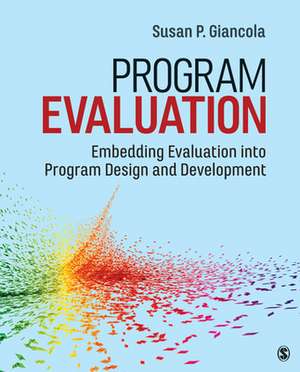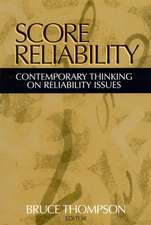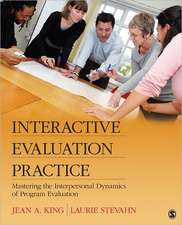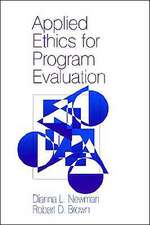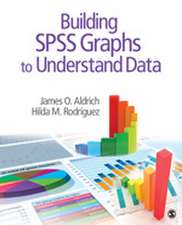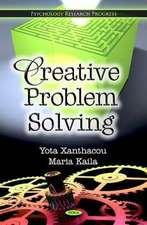Program Evaluation: Embedding Evaluation into Program Design and Development
Autor Susan P. Giancolaen Limba Engleză Paperback – 30 apr 2020
Preț: 727.26 lei
Preț vechi: 982.78 lei
-26% Nou
139.16€ • 151.64$ • 117.26£
Carte disponibilă
Livrare economică 02-16 aprilie
Livrare express 19-25 martie pentru 35.26 lei
Specificații
ISBN-10: 150635744X
Pagini: 432
Dimensiuni: 187 x 232 x 28 mm
Greutate: 0.66 kg
Ediția:1
Editura: SAGE Publications
Colecția Sage Publications, Inc
Locul publicării:Thousand Oaks, United States
Recenzii
“An excellent addition to books on program evaluation. This book's practicality and focus on techniques of embedding evaluations in program design and development is invaluable. Multiple audiences including graduate students, researchers, practitioners and policy makers would find the text useful.”
“This is a great book that provides the details you need to teach and study program evaluation. The author has tremendous skill and ability to present the materials in and interesting and understandable fashion.”
“This text would be a great addition to a research methods course providing the history as well as the various types of program evaluations for the appropriate type of programs.”
“This unique book relates contemporary realities of program evaluation with a particular focus on 'how to' with relevant real-world examples. This well-conceptualized and well-written piece provides much needed insights on the rudiments of evaluation from the very beginning to the end and serves as invaluable resource to faculty, students, policy makers and key administrators across various levels of government/public affairs. The author candidly narrates the benefits and challenges of evaluation in ways that everyone involved in any form of evaluation at any level can relate to. The book's uniqueness makes it a key addition to the existing literature on evaluation in theory, policy, and praxis terms.”
“This book serves as an excellent 'How to Manual' for conducting program evaluations. The presentation is both interesting and concise.”
Cuprins
Preface
About the Author
SECTION I • INTRODUCTION
Chapter 1 • Evaluation Matters
1.1 What Is Evaluation?
1.2 Why Evaluate?
1.3 Values and Standards in Evaluation
1.4 Types of Evaluation
1.5 Internal and External Evaluation
1.6 Embedding Evaluation Into Programs
1.7 Textbook Organization
1.8 Chapter Summary
Reflection and Application
Chapter 2 • History of Evaluation
2.1 The Evolution of Evaluation
2.2 The History of Ethics in Research and Evaluation
2.3 Current Issues in Evaluation
2.4 Chapter Summary
Reflection and Application
Chapter 3 • Evaluation Ethics
3.1 Ethics Defined
3.2 Research Ethics Guidelines and Legislation
3.3 IRB Protocols and Amendments
3.4 Ethical Responsibilities of Organizations
3.5 Ethical Responsibilities of Evaluators
3.6 Additional Considerations
3.7 Chapter Summary
Reflection and Application
Chapter 4 • Evaluation Ideologies and Approaches
4.1 Inquiry and Ideology
4.2 Evaluation Ideology
4.3 Evaluation Design
4.4 Evaluation Approach
4.5 Embedded Evaluation
4.6 Chapter Summary
Reflection and Application
SECTION II • EMBEDDED EVALUATION: DESIGN
Chapter 5 • DEFINE, Part 1: Understanding the Program
5.1 Embedded Evaluation
5.2 Understanding the Program
5.3 Delineating Goals and Strategies
5.4 Explaining the Program Theory
5.5 Determining Contextual Conditions
5.6 Program Theory and Other Theories
5.7 Considering Alternative Theories
5.8 Chapter Summary
Reflection and Application
Chapter 6 • DEFINE, Part 2: Modeling the Program
6.1 Chapter in Context
6.2 What Is a Logic Model?
6.3 Creating the Logic Model
6.4 Using the Program’s Logic Model
6.5 More on Logic Models
6.6 Chapter Summary
Reflection and Application
Chapter 7 • PLAN, Part 1: Planning the Evaluation
7.1 Creating Evaluation Questions
7.2 Embedding Evaluation Questions Into Your Logic Model
7.3 What Data Should I Collect?
7.4 Creating the Evaluation Matrix
7.5 Chapter Summary
Reflection and Application
Chapter 8 • PLAN, Part 2: Designing the Evaluation
8.1 Evaluation Design
8.2 Evaluation Methods and Tools
8.3 Evaluation Matrix: Identifying Data Sources
8.4 Chapter Summary
Reflection and Application
SECTION III • EMBEDDED EVALUATION: IMPLEMENTATION
Chapter 9 • IMPLEMENT, Part 1: Implementing the Evaluation
9.1 Chapter in Context
9.2 Informed Consent
9.3 Collecting the Data
9.4 Organizing Quantitative Data
9.5 Organizing Qualitative Data
9.6 Chapter Summary
Reflection and Application
Chapter 10 • IMPLEMENT, Part 2: Analyzing the Data
10.1 Chapter in Context
10.2 Quantitative Data Analysis: Descriptive Statistics
10.3 Quantitative Data Analysis: Inferential Statistics
10.4 Qualitative Data Analysis
10.5 Managing the Unexpected and Unintended
10.6 Chapter Summary
Reflection and Application
Chapter 11 • INTERPRET: Interpreting the Results
11.1 The Home Stretch
11.2 Examining Results
11.3 Interpreting Results
11.4 Communicating Evaluation Results
11.5 Enhancing Reporting and Communication
11.6 Chapter Summary
Reflection and Application
Chapter 12 • INFORM and REFINE: Using Evaluation Results
12.1 Purpose of Evaluation
12.2 Pre-Evaluation: Efforts to Promote Utilization
12.3 During Evaluation: Ongoing Utilization Efforts
12.4 Post-Evaluation and Data Dissemination
12.5 Chapter Summary
Reflection and Application
SECTION IV • RESOURCES
Chapter 13 • Case Study Applications
13.1 LEND Evaluation
13.2 ACCEL Evaluation
13.3 YAP Evaluation
Appendices: Special Topics
Appendix A: Needs Assessment
Appendix B: Politics and Policy
Appendix C: Developmental Evaluation
Appendix D: Translational Research Evaluation
Glossary
References
Index
Notă biografică
Sue Giancola, Ph.D. has over 20 years of experience as an evaluator in both academia and private business. Prior to becoming an evaluator, she worked in corporate and higher education settings on process improvement initiatives. Dr. Giancola is a graduate of the University of Pennsylvaniäs Policy Research, Evaluation, and Measurement program. She also has a bachelor¿s degree from the University of Virginia in systems engineering and a master¿s degree from Pennsylvania State University in management. She is currently Senior Associate Director of the Center for Research in Education and Social Policy (CRESP) at the University of Delaware. Her work focuses on research and evaluation of programs to improve human services, primarily in the areas of education and health. She evaluates many local, state, and federal initiatives, including projects funded through NIH, NSF, U.S. Department of Health and Human Services, and U.S. Department of Education. Dr. Giancola is a member of the American Evaluation Association and the American Educational Research Association. She lives in Kennett Square, Pennsylvania with her husband and two daughters.
